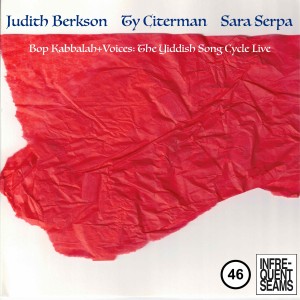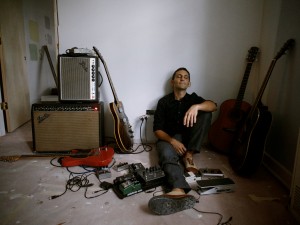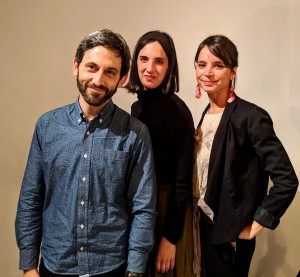
Artist
IMAGES: To download, click above. Photo 1: Ty Citerman by Eli Koppel. Photo 2: Ty Citerman, Judith Berkson, and Sara Serpa by Maria Grand.
LINKS:
Ty Citerman
Infrequent Seams
Ty Citerman’s second installment in his Bop Kabbalah+Voices project is The Yiddish Song Cycle Live, a stunning summer 2022 follow up to 2020’s “When You Speak of Times to Come (Ven Du Redst Fun Naye Tsaytn).” That debut album was called “…Inspiring and moving…beautifully arranged and delivered…” by Eyal Hareuveni (Salt Peanuts). This new live album was recorded during the four-day Infrequent Seams Streamfest on June 17 2021, a night in which Citerman’s trio with vocalists Sara Serpa and Judith Berkson played a focused and passionate set after a two-year pandemic hiatus from live stages. Also included with the release is a high definition three-camera video of their performance – a front row seat at the concert!
The Yiddish Song Cycle Live is a seamless 29-minute presentation of five leftist texts from the 150 year-old Yiddish labor movement, organically woven together with their English translations in improvisatory vocal collage. These texts are given an unprecedented modern musical treatment throughout: delicate, plaintive, hypnotic and passionate.
Ms. Serpa and Ms. Berkson’s contributions leave the listener deeply engrossed, enchanted and sometimes even speechless. They each have distinctive sounds: Serpa is an accomplished jazz singer and composer with a silky, fluid voice; and Berkson is a precise microtonal soprano with a side gig as a cantor. With Citerman’s compositions as the vehicle, their voices dance, soar and sometimes erupt. There is the unsettling beauty of close, dissonant harmonies on “Gebet,” in which the Avrom Reyzen poem intones, “Baler mikh, gott, baler…” (“Teach me how to deal with the world, oh lord…”). And there is the art song interplay of “Ver Tut Stroyen Movern, Palatsn,” in which Berkson and Serpa often sing unaccompanied or with only sparse, understated guitar work. The preview single and final installment of the song cycle, “Es Rirt Zikh” sets a labor poem excerpt by Morris Winchevsky from 1886; as the lyrics repeat, “Hert ir kinder, vi es rirt zikh…?” (“Do you hear, children, how it’s moving…?”), the listener is propelled by a sense of musical and political possibility during current, turbulent times.
These texts originated at the turn of the 20th century, during the time of Citerman’s grandparents’ escape from state-sponsored persecution in Ukraine and Russia. That generation brought not only their varied and sometimes limited skills as workers to the United States, but also their political consciousness from the fight against Tsar Nicholas II and a desire to organize their workplaces. The lyrics for “Mit Eyn Hant Hostu Undz Gegebn Di Konstitutsieh (With One Hand You Gave Us the Constitution)” are from the 1905 Russian Revolution, and yet its cries against fascism and false promises by authoritarian rulers ring true today. Berkson and Serpa repeatedly shout, “Arop, du henker, fun dayn tron!” (“Down with you, you executioner, you murderer, get off the throne!”), and that fierce demand is underscored by heavy guitar chords and an electronic noise tapestry that form a completely 21st-century sound world.
Citerman’s performance career took off in the the late 1990’s NYC Knitting Factory scene with the raucous and irreverent quartet Gutbucket, which toured extensively and released six acclaimed albums of its own. His Bop Kabbalah project began with a commission by John Zorn to record for Tzadik Records’ celebrated Radical Jewish Culture Series in 2014. That first installment of Bop Kabbalah was an instrumental quartet, but soon, Citerman began writing for voices while getting his master’s degree in music composition at Brooklyn College, studying with composers Tania León, Dalit Warshaw and Jason Eckardt. He knew that adding voices and text to his music would provide it with a new sense of clarity and immediacy. In late 2015, he began researching Yiddish labor songs and poems and was struck by their relevance to today’s American political landscape; the seeds for this song cycle were planted.
Having played with artists like John Zorn, Glenn Branca, Dana Lyn, Rhys Chatham, Kaoru Watanabe, the string quartet Ethel, James Ilgenfritz’s Anagram Ensemble and many others, Citerman is a guitarist with a broad palette of musical interests and ideas. His guitar work on “The Yiddish Song Cycle Live” is nimble and idiosyncratic. He has a beautiful, deep tone that is on display unadorned during the opening of “Ver Tut Stroyen Movern, Palatsn?” He also fancies lush, electronic-infused harmonies that fill the sound sphere as well as sparse, delicate maneuvers requiring a restraint not found with most guitarists. His improvisations during “Es Rirt Zikh” are blues-tinged meditations on the song’s main theme, with a touch of Thelonious Monk-inspired dissonance. And on “Mit Eyn Hant…,” he loops layers of ring modulator and other found-object, prepared guitar sounds that make the instrument sound like more than just a guitar.
The Yiddish Song Cycle Live was recorded and mixed at Scholes Street Studio by René Pierre Allain in front of a live audience and mastered by Grammy Award-winning engineer Damon Whittemore. It is scheduled for digital release on August 5, 2022 on Infrequent Seams, the label run by composter/bassist/bandleader James Ilgenfritz. Ty Citerman is thrilled to continue his work among the ranks of other forward-thinking label-mates like Elliot Sharp, Miya Masaoka, Myra Melford, Zeena Parkins and many others!



